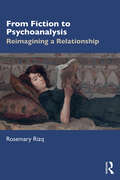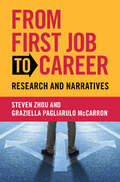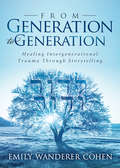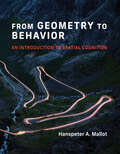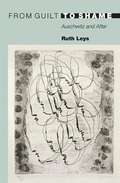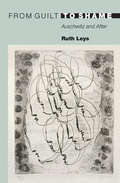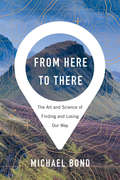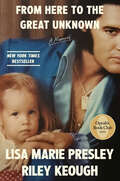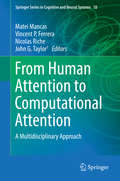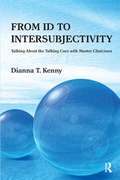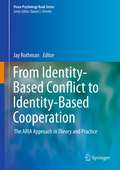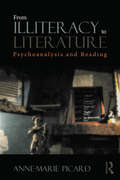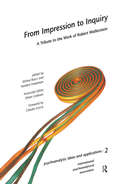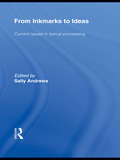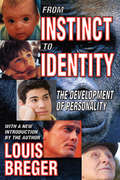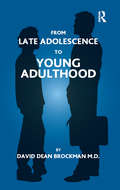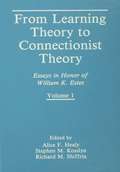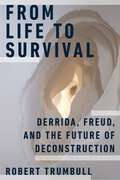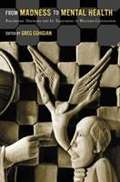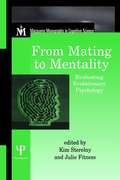- Table View
- List View
From Fiction to Psychoanalysis: Reimagining a Relationship
by Rosemary RizqHow can reading literary fiction shed light on the way we speak ourselves within psychoanalysis? Rather than offering psychoanalytic insights into literature, Rosemary Rizq, a practicing psychologist and psychoanalytic psychotherapist, explores what literary fiction can bring to psychoanalysis. In this fascinating collection of essays, she draws on stories written by authors ranging from Henry James to Kazuo Ishiguro and Colm Tóibín. By investigating the possibilities for ‘fruitful encounter and dynamic exchange’ between psychoanalysis and literature, Rizq sets out to offer a fresh perspective on theoretical ideas that are often presented within the psychoanalytic literature in abstract, overly technical ways. In a remarkably fresh approach, this book explores how fiction can inform, illuminate and even transform our understanding of psychoanalysis. Written for practicing clinicians, academics and students as well as for the wider public, this book offers an original and revealing perspective on the overlapping knowledge-claims and concerns of both literary fiction and psychoanalysis.
From First Job to Career: Research and Narratives
by Graziella Pagliarulo McCarron Steven ZhouFrom First Job to Career is an anthology that weaves together inspiring first-job stories from people across diverse industries and backgrounds, offering career seekers of all ages the chance to connect with relatable experiences and hard-earned wisdom. This collection reveals the different paths people take in shaping their careers and serves as a resource for readers to identify with and learn from others' journeys. Paired with a comprehensive review of research in vocational psychology and career counseling, the book distills key principles and provides actionable resources for navigating the job search and building a meaningful career.
From Freud To Kafka: The Paradoxical Foundation of the Life-and-Death Instinct
by Philippe RefabertThis book takes the reader on a captivating journey leading from an erroneous founding assumption inherited from Freud, to the proposal of a principle better suited to allowing the psychoanalyst to accompany the patient out of his impasse. The founding assumption of the book, already questioned by many analysts among whom Sandor Ferenczi figures as a brilliant forerunner, was the author's starting point in re-examining the basic precepts of psychoanalysis. Reading Kafka made the author conclude that this masterful storyteller describes borderline situations, so familiar to him, better than anyone. An avid reader of Freud, Kafka suggests that the human capacity to bear a paradoxical position between life and death is not given to the child naturally, at birth. Kafka seems to say that giving life is easy, but that giving it the necessary support in the form of the trace of death is more problematic.
From Fury to Freedom
by Lela Gilbert Raul A. RiesFrom Fury to Freedom is a positive book that will encourage many families to admit some of the most private, even intimate and depressing feelings they have had to endure. The realization that God is the ultimate answer for all their needs will help them to live through these devastating dark days. We cannot deny that our God is a God of miracles. He took Raul from the pits of hell, from the cocoon of despair, insecurity, fear, hate, and self-destruction, into the most wonderful healing—SALVATION; the healing of his soul and spirit. Raul is evidence of how God's grace can spare the life of a young boy and nurture him into manhood. Jesus cradled Raul's head in His bosom, and kissed away his pain. He gave him the direction and love for which he was desperately searching.
From Generation to Generation: Healing Intergenerational Trauma Through Storytelling
by Emily Wanderer CohenMost children and grandchildren of Holocaust survivors felt the omnipresence of the Holocaust throughout their childhood and for many, the spectre of the Holocaust continues to loom large through the phenomenon of &“intergenerational&” or &“transgenerational&” trauma. In From Generation to Generation: Healing Intergenerational Trauma Through Storytelling, Emily Wanderer Cohen connects the dots between her behaviors and choices and her mother&’s Holocaust ex-periences. In a series of vivid, emotional—and sometimes gut-wrenching—stories, she illustrates how the Holocaust continues to have an impact on current and future generations. Plus, the prompts at the end of each chapter enable you to explore your own intergenerational trauma and begin your healing journey.Part memoir and part self-discovery, if you&’re a second-generation (2G) or third-generation (3G) Holo-caust survivor—or you&’re experiencing intergenerational trauma of any kind—and you&’re ready to heal from that trauma, you need to read this book.
From Geometry to Behavior: An Introduction to Spatial Cognition
by Hanspeter A. MallotAn overview of the mechanisms and evolution of spatial cognition, integrating evidence from psychology, neuroscience, cognitive science, and computational geometry.Understanding how we deal with space requires input from many fields, including ethology, neuroscience, psychology, cognitive science, linguistics, geography, and spatial information theory. In From Geometry to Behavior, cognitive neuroscientist Hanspeter A. Mallot provides an overview of the basic mechanisms of spatial behavior in animals and humans, showing how they combine to support higher-level performance. Mallot explores the biological mechanisms of dealing with space, from the perception of visual space to the constructions of large space representations: that is, the cognitive map. The volume is also relevant to the epistemology of spatial knowledge in the philosophy of mind.Mallot aims to establish spatial cognition as a scientific field in its own right. His general approach is psychophysical, in that it focuses on quantitative descriptions of behavioral performance and their real-world determinants, thus connecting to the work of theorists in computational neuroscience, robotics, and computational geometry. After an overview of scientific thinking about space, Mallot covers spatial behavior and its underlying mechanisms in the order of increasing memory involvement. He describes the cognitive processes that underlie advanced spatial behaviors such as directed search, wayfinding, spatial planning, spatial reasoning, object building and manipulation, and communication about space. These mechanisms are part of the larger cognitive apparatus that also serves visual and object cognition; understanding events, actions, and causality; and social cognition, which includes language. Of all of these cognitive domains, spatial cognition most likely occurred first in the course of evolution and is the most widespread throughout the animal kingdom.
From Grammar to Meaning
by Ivano Caponigro Carlo CecchettoIn recent years, the study of formal semantics and formal pragmatics has grown tremendously showing that core aspects of language meaning can be explained by a few principles. These principles are grounded in the logic that is behind - and tightly intertwined with - the grammar of human language. In this book, some of the most prominent figures in linguistics, including Noam Chomsky and Barbara H. Partee, offer new insights into the nature of linguistic meaning and pave the way for the further development of formal semantics and formal pragmatics. Each chapter investigates various dimensions in which the logical nature of human language manifests itself within a language and/or across languages. Phenomena like bare plurals, free choice items, scalar implicatures, intervention effects, and logical operators are investigated in depth and at times cross-linguistically and/or experimentally. This volume will be of interest to scholars working within the fields of semantics, pragmatics, language acquisition and psycholinguistics.
From Guilt to Shame: Auschwitz and After
by Ruth LeysWhy has shame recently displaced guilt as a dominant emotional reference in the West? After the Holocaust, survivors often reported feeling guilty for living when so many others had died, and in the 1960s psychoanalysts and psychiatrists in the United States helped make survivor guilt a defining feature of the "survivor syndrome." Yet the idea of survivor guilt has always caused trouble, largely because it appears to imply that, by unconsciously identifying with the perpetrator, victims psychically collude with power. In From Guilt to Shame, Ruth Leys has written the first genealogical-critical study of the vicissitudes of the concept of survivor guilt and the momentous but largely unrecognized significance of guilt's replacement by shame. Ultimately, Leys challenges the theoretical and empirical validity of the shame theory proposed by figures such as Silvan Tomkins, Eve Kosofsky Sedgwick, and Giorgio Agamben, demonstrating that while the notion of survivor guilt has depended on an intentionalist framework, shame theorists share a problematic commitment to interpreting the emotions, including shame, in antiintentionalist and materialist terms.
From Guilt to Shame: Auschwitz and After (20/21 #8)
by Ruth LeysWhy has shame recently displaced guilt as a dominant emotional reference in the West? After the Holocaust, survivors often reported feeling guilty for living when so many others had died, and in the 1960s psychoanalysts and psychiatrists in the United States helped make survivor guilt a defining feature of the "survivor syndrome." Yet the idea of survivor guilt has always caused trouble, largely because it appears to imply that, by unconsciously identifying with the perpetrator, victims psychically collude with power. In From Guilt to Shame, Ruth Leys has written the first genealogical-critical study of the vicissitudes of the concept of survivor guilt and the momentous but largely unrecognized significance of guilt's replacement by shame. Ultimately, Leys challenges the theoretical and empirical validity of the shame theory proposed by figures such as Silvan Tomkins, Eve Kosofsky Sedgwick, and Giorgio Agamben, demonstrating that while the notion of survivor guilt has depended on an intentionalist framework, shame theorists share a problematic commitment to interpreting the emotions, including shame, in antiintentionalist and materialist terms.
From Here to There: The Art and Science of Finding and Losing Our Way
by Michael BondA wise and insightful exploration of human navigation, what it means to be lost, and how we find our way. How is it that we can walk unfamiliar streets while maintaining a sense of direction? Come up with shortcuts on the fly, in places we’ve never traveled? The answer is the complex mental map in our brains. This feature of our cognition is easily taken for granted, but it’s also critical to our species’ evolutionary success. In From Here to There Michael Bond tells stories of the lost and found—Polynesian sailors, orienteering champions, early aviators—and surveys the science of human navigation. Navigation skills are deeply embedded in our biology. The ability to find our way over large distances in prehistoric times gave Homo sapiens an advantage, allowing us to explore the farthest regions of the planet. Wayfinding also shaped vital cognitive functions outside the realm of navigation, including abstract thinking, imagination, and memory. Bond brings a reporter’s curiosity and nose for narrative to the latest research from psychologists, neuroscientists, animal behaviorists, and anthropologists. He also turns to the people who design and expertly maneuver the world we navigate: search-and-rescue volunteers, cartographers, ordnance mappers, urban planners, and more. The result is a global expedition that furthers our understanding of human orienting in the natural and built environments. A beguiling mix of storytelling and science, From Here to There covers the full spectrum of human navigation and spatial understanding. In an age of GPS and Google Maps, Bond urges us to exercise our evolved navigation skills and reap the surprising cognitive rewards.
From Here to the Great Unknown: A Memoir
by Lisa Marie Presley Riley Keough#1 NATIONAL BESTSELLER • NEW YORK TIMES BESTSELLER • OPRAH&’S BOOK CLUB PICK • Born to an American myth and raised in the wilds of Graceland, Lisa Marie Presley tells her whole story for the first time in this raw, riveting, one-of-a-kind memoir faithfully completed by her daughter, Riley Keough. A PEOPLE BEST BOOK OF THE YEARIn 2022, Lisa Marie Presley asked her daughter to help finally finish her long-gestating memoir. A month later, Lisa Marie was dead, and the world would never know her story in her own words, never know the passionate, joyful, caring, and complicated woman that Riley loved and now grieved. Riley got the tapes that her mother had recorded for the book, lay in her bed, and listened as Lisa Marie told story after story about smashing golf carts together in the yards of Graceland, about the unconditional love she felt from her father, about being upstairs, just the two of them. About getting dragged screaming out of the bathroom as she ran toward his body on the floor. About living in Los Angeles with her mother, getting sent to school after school, always kicked out, always in trouble. About her singular, lifelong relationship with Danny Keough, about being married to Michael Jackson, what they had in common. About motherhood. About deep addiction. About ever-present grief. Riley knew she had to fulfill her mother&’s wish to reveal these memories, incandescent and painful, to the world. To make her mother known. This extraordinary book is written in both Lisa Marie&’s and Riley&’s voices, a mother and daughter communicating—from this world to the one beyond—as they try to heal each other. Profoundly moving and deeply revealing, From Here to the Great Unknown is a book like no other—the last words of the only child of an American icon.
From Human Attention to Computational Attention
by John G. Taylor Matei Mancas Vincent P. Ferrera Nicolas RicheThis both accessible and exhaustive book will help to improve modeling of attention and to inspire innovations in industry. It introduces the study of attention and focuses on attention modeling, addressing such themes as saliency models, signal detection and different types of signals, as well as real-life applications. The book is truly multi-disciplinary, collating work from psychology, neuroscience, engineering and computer science, amongst other disciplines. What is attention? We all pay attention every single moment of our lives. Attention is how the brain selects and prioritizes information. The study of attention has become incredibly complex and divided: this timely volume assists the reader by drawing together work on the computational aspects of attention from across the disciplines. Those working in the field as engineers will benefit from this book's introduction to the psychological and biological approaches to attention, and neuroscientists can learn about engineering work on attention. The work features practical reviews and chapters that are quick and easy to read, as well as chapters which present deeper, more complex knowledge. Everyone whose work relates to human perception, to image, audio and video processing will find something of value in this book, from students to researchers and those in industry.
From Id to Intersubjectivity: Talking about the Talking Cure with Master Clinicians
by Dianna T. KennyPsychoanalysis has moved a long way from the techniques of classical psychoanalysis but these changes have not been understood or disseminated to the wider community. Even university scholars and students of psychology have an archetypal view of the original form of psychoanalysis and do not appreciate that major changes have occurred. This book commences with a detailed outline of the origins of psychoanalysis and an explanation of key terms, which are often misinterpreted. The second chapter examines the changes that have occurred in theorising and practice over the past 120 years and explores key developments. The following chapters contain an interview with a practitioner working in one of each of the four major branches of modern psychoanalysis - object relations, attachment informed psychotherapy, intensive short-term dynamic psychotherapy, and relational and intersubjective theory. There follows textual, content, conceptual, and thematic analyses of the transcripts of interviews and commentaries on a therapy excerpt exploring commonalities and differences among these theoretical approaches.
From Identity-Based Conflict to Identity-Based Cooperation
by Jay RothmanThrough proper engagement, identity-based conflict enhances and develops identity as a vehicle to promote creative collaboration between individuals, the groups they constitute and the systems they forge. This handbook describes the specific model that has been developed as well as various approaches and applications to identity-conflict used throughout the world.
From Illiteracy to Literature: Psychoanalysis and Reading
by Anne-Marie PicardFrom Illiteracy to Literature presents innovative material based on research with ‘non-reading’ children and re-examines the complex relationship between psychoanalysis and literature, through the lens of the psychical significance of reading: the forgotten adventure of our coming to reading. Anne-Marie Picard draws on two specific fields of interest: firstly the wish to understand the nature of literariness or the "literary effect", i.e. the pleasures (and frustrations) we derive from reading; secondly research on reading pathologies carried out at St Anne’s Hospital, Paris. The author uses clinical observations of non-reading children to answer literary questions about the reading experience, using psychoanalytic theory as a conceptual framework. The notion that reading difficulties or phobias should be seen as a symptom in the psychoanalytic sense, allows Picard to shed light on both clinical vignettes taken from children’s case histories and reading scenes from literary texts. Children experiencing difficulties in learning to read highlight the imaginary stakes of the confrontation with the arbitrary nature of the letter and the "price to pay" for one’s entrance into the Symbolic. Picard applies the lesson "taught" by these children to a series of key literary texts featuring, at their very core, this confrontation with the signifier, with the written code itself.. This book argues that there is something in literature that drives us back, again and again, to the loss we have suffered as human beings, to what we had to undergo to become human: our subjection to the common place of language. Picard shows complex Lacanian concepts "at work" in the field of reading pathologies, emphasizing close reading and a clinical attention to the "letter" of the texts, far from the "psychobiographical" attempts at psychologizing literary authors. From Illiteracy to Literature presents a novel psychodynamic approach that will be of great interest to psychotherapists and language pathologists, appealing to literary scholars and those interested in the process of reading and "literariness."
From Impression to Inquiry: A Tribute to the Work of Robert Wallerstein (The International Psychoanalytical Association Psychoanalytic Ideas and Applications Series)
by Wilma BucciFrom Impression to Inquiry is a tribute to the work of Robert Wallerstein and is a homage to his exceptional attitude regarding the problem of agreements, divergences, and uncertainties in psychoanalysis.
From Inkmarks to Ideas: Current Issues in Lexical Processing
by Sally AndrewsReading is one of the most sophisticated demonstrations of human pattern recognition and symbolic processing skill. Skilled readers effortlessly comprehend written text at rates of at least 300 words per minute, despite the complex interactions between perceptual, cognitive and memory processes required for effective comprehension. Understanding how we achieve this remarkable feat has been a focus of investigation since the birth of experimental psychology. Over the last two decades, visual word recognition has been at the forefront of developments in cognitive science. This book brings together many of the most influential contributors to these developments to reflect on current issues in the cognitive science of lexical processing and the methods required for further progress. The first section focuses on computational models. Written words provide a fertile context for large-scale modeling and the domain of lexical retrieval has become a test-bed for evaluating competing theoretical frameworks. The later sections draw upon cognitive psychology, linguistics, philosophy, computer science and neuroscience to elaborate critical theoretical issues and to develop novel research tools. From Inkmarks to Ideas provides advanced students and researchers with a comprehensive overview of the critical theoretical and empirical controversies in current research on the cognitive science of lexical processing and reading.
From Instinct to Identity: The Development of Personality
by David HardisonFrom Instinct to Identity begins an account of personality development by tracing the legacy of the human species from its primate heritage to its present form. Findings from ethology, primate studies, linguistics, and other sources are used to construct an account of the unique features of man. The evolution of early cultures is shown through use of anthropological work. The ideas of Sigmund Freud, particularly as modifi ed by Erik Erikson, are presented together with the theories and findings of Jean Piaget and his collaborators in a series of chapters that follow the person from infancy to adolescence. Other chapters examine play, dreams, and fantasy; anxiety and its effects on the development of self; moral development; and identity. The emphasis throughout is on the growth of self, and its impact on social norms. The author blends together theories and findings from psychoanalysis, psychology, ethology, humanistic psychology, and child development, develops a model of human motivation in which the basic emotional systems of love, anxiety, aggression, curiosity and intelligence are traced from their primate background through the human life cycle. He brings together classic ideas on guilt and conscience with research on moral reasoning and ego development, and clarifies difficult ideas in a clear, direct prose style. This classic volume, now available in paperback with a new introduction by the author, will fi nd a new audience among anthropologists as well as psychologists interested in the evolution of human behavior.
From Klein to Kristeva: Psychoanalytic Feminism and the Search for the "Good Enough" Mother (Critical Perspectives On Women And Gender)
by Janice Doane Devon HodgesRecent feminist and psychoanalytic accounts of mothering have been profoundly shaped by the work of Melanie Klein, D. W. Winnicott, Nancy Chodorow, and Julia Kristeva. Although their work spans many decades, these writers share the goal of understanding object relations, that is, the child's relation to internalized "objects" —most often the mother, as the child's first caretaker. Doane and Hodges chart the development of "mother-centered" psychoanalysis and its influence on feminist thought in a number of fields and show how the effort to elevate the importance of the mother has become implicated in the current effort to restrict possibilities for women to "opportunities" associated with hearth and home. The authors argue that discussions of the maternal role always exist within an ideological framework in which they are purveyed to particular groups at particular times. In our own historical moment, ideas of maternal propriety have been vigorously argued, as in custody battles, where experts debate whether or not individual women are "good enough" mothers. From Klein to Kristeva traces the ways in which object-relations accounts of mothering have worked to encourage the view that "good enough" mothers find "their whole self" at home. What does this view of mothering mean for working women? How does it help promote arguments that "fetal rights" are more important than a mother's own desires? By recovering the historial context of object-relations theory and closely attending to the language of important theorists, Doane and Hodges make visible the extraordinary influence of object relations on the discourses in many fields and demonstrate the power of psychological theory to shape both popular and academic discussions of maternal propriety.
From Late Adolescence to Young Adulthood
by David Dean Brockman'By focusing on the transition from late adolescence to young adulthood, this innovative book makes a unique and valuable contribution to our understanding of a neglected area of development. Drawing on his extensive clinical experience with this age group as well as his understanding of the complex cultural and social forces that impinge on young people today, Brockman has produced that rarest of volumes: a work that is engaging, creative and wise while at the same time being eminently practical and useful. Addressing issues that are highly relevant to our older patients as well as our younger ones, this landmark book should be required reading for every mental health professional.'- Theodore J. Jacobs, M.D.'Dr. Brockman takes us to unexplored terrain. His is a journey to a place where most of us have lived but never really investigated: our life from age 20 to the early 30s. It is always a pleasant surprise to look at something which has been so familiar and now is seen in a new light.
From Learning Theory to Connectionist Theory: Essays in Honor of William K. Estes, Volume I; From Learning Processes to Cognitive Processes, Volume II
by William K. EstesThese two volumes consist of chapters written by students and colleagues of W.K. Estes. The books' contributors -- themselves eminent figures in the field -- reflect on Estes' sweeping contributions to mathematical as well as cognitive and experimental psychology. As indicated by their titles, Volume I features mathematical and theoretical essays, and Volume II presents cognitive and experimental essays. Both volumes contain insightful literature reviews as well as descriptions of exciting new theoretical and empirical advances. Many of the essays also incorporate personal reminiscences reflecting the authors' fond affection for their illustrious mentor.
From Life to Survival: Derrida, Freud, and the Future of Deconstruction
by Robert TrumbullContemporary continental thought is marked by a move away from the “linguistic turn” in twentieth-century European philosophy, as new materialisms and ontologies seek to leave behind the thinking of language central to poststructuralism as it has been traditionally understood. At the same time, biopolitical philosophy has brought critical attention to the question of life, examining new formations of life and death. Within this broader turn, Derridean deconstruction, with its apparent focus on language, writing, and textuality, is generally set aside.This book, by contrast, shows the continued relevance of deconstruction for contemporary thought’s engagement with resolutely material issues and with matters of life and the living. Trumbull elaborates Derrida’s thinking of life across his work, specifically his recasting of life as “life death,” and in turn, survival or living on. Derrida’s activation of Freud, Trumbull shows, is central to this problematic and its consequences, especially deconstruction’s ethical and political possibilities. The book traces how Derrida’s early treatment of Freud and his mobilization of Freud’s death drive allow us to grasp the deconstructive thought of life as constitutively exposed to death, the logic subsequently rearticulated in the notion of survival. Derrida’s recasting of life as survival, Trumbull demonstrates, allows deconstruction to destabilize inherited understandings of life, death, and the political, including the dominant configurations of sovereignty and the death penalty.
From Madness To Mental Health: Psychiatric Disorder And Its Treatment In Western Civilization
by Greg Eghigian Gail HornsteinFrom Madness to Mental Health neither glorifies nor denigrates the contributions of psychiatry, clinical psychology, and psychotherapy, but rather considers how mental disorders have historically challenged the ways in which human beings have understood and valued their bodies, minds, and souls. Greg Eghigian has compiled a unique anthology of readings, from ancient times to the present, that includes Hippocrates; Julian of Norwich's Revelations of Divine Love, penned in the 1390s; Dorothea Dix; Aaron T. Beck; Carl Rogers; and others, culled from religious texts, clinical case studies, memoirs, academic lectures, hospital and government records, legal and medical treatises, and art collections. Incorporating historical experiences of medical practitioners and those deemed mentally ill, From Madness to Mental Health also includes an updated bibliography of first-person narratives on mental illness compiled by Gail A. Hornstein.
From Madness to Mindfulness: Reinventing Sex for Women
by Jennifer Gunsaullus&“I learned about the mechanics of female sexual pleasure in my sex ed class.&” &“I am able to have a difficult conversation with my partner about our relationship.&”&“I can boldly and openly carry a tampon to the restroom in public.&”"I am able to pursue my pleasure and my partner's pleasure during sex."&“I am totally comfortable being naked in front of a new partner.&”If you disagreed with any of these statements (or all of them), you&’re not alone. You are one of many, many women who are feeling the effects of &“sexual madness.&” According to Jennifer Gunsaullus, PhD, sociologist and sex coach, it&’s time for women to break free from the societal baggage they carry in relation to sexual education, expectations, and fulfillment. From Madness to Mindfulness sets out to help women empower themselves to transition out of a state of sexual madness, and into a state of sexual mindfulness—a state in which women can give themselves permission to feel more worthy of love and great sex (and then have it!). Dr. Jenn will guide you through the process of assessing levels of &“mis-education&” in regard to relationships, communication, sex, passion, desire, and body image, and integrating mindfulness practices to overcome your own personal &“madness.&” Replete with personal anecdotes and a wide array of client stories, along with guided questions, action items, and tips to create a personal Reinventing Sex plan, Dr. Jenn will help you to become a thriving sexual being… on your own terms.
From Mating to Mentality: Evaluating Evolutionary Psychology (Macquarie Monographs in Cognitive Science)
by Kim Sterelny Julie FitnessCovering a range of topics, from the evolution of language, theory of mind, and the mentality of apes, through to psychological disorders, human mating strategies and relationship processes, this volume makes a timely and significant contribution to what is fast becoming one of the most prominent and fruitful approaches to understanding the nature and psychology of the human mind.
